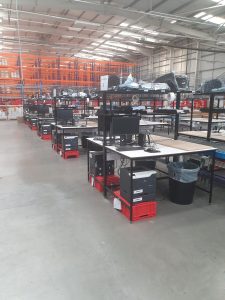Your basket is currently empty!

There is an estimated £10bn of clothing stockpiled in warehouses, prompting major fashion retailers including Peacocks, Arcadia and Primark to no longer accept deliveries to their warehouses.
Most high-street clothing shops are closed due to the coronavirus lockdown, but online orders are still being processed. Sales of most fashion retailers are down, which has led to large stocks of unsold items in warehouses. Companies have new stock arriving on container ships, but have no room to store the new deliveries. Meanwhile, containers that are not removed from the docks incur a daily storage fee.
It is estimated that 90% of the warehouse space in the UK is full. Clothing retailers are urgently searching for extra storage capacity for when containers containing new stock arrive at the ports.
A UK-based storage racks manufacturer can supply extra racks to extend warehouses if there is space. Making storage racks higher up to the roof space is possible in some warehouses.
Clothing retailers may make large price cuts to existing stock, hoping to sell them quickly to make room for new stock. Seasonal items, like winter coats, are difficult to sell in the spring/summer season.
Some retailers have gone into administration, and these include Debenhams and Cath Kidston. Administrators are looking for buyers for these companies so that clothing stocks can be sold. The Arcadia Group that owns Topshop and Miss Selfridge are closing hundreds of stores. These companies were already failing before the coronavirus epidemic, but the lockdown has accelerated their closure.
You may also interested in:

Warehouse operators warned about energy compliance crisis
New energy regulations could render some warehouse space unusable by 2030 due to
The growing demand for warehouse conveyor belts
Research by Global Market Insights shows that the worldwide conveyor market was worth 5.7 billion US dollars in 2024 and is
